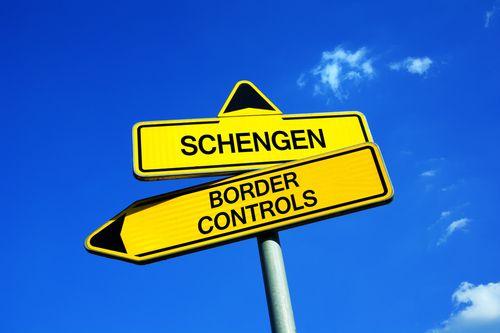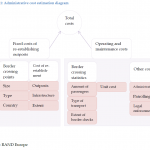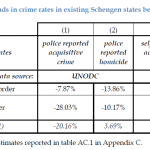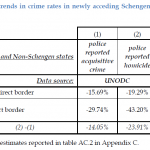Written by Wouter van Ballegooij,

The Schengen Area is one of the major achievements of European integration as it facilitates the free movement of persons, goods and services which has brought significant benefits to the European economy and citizens. Yet, the recent unprecedented influx of refugees and migrants to Europe has exposed serious deficiencies in the common asylum, migration and external border control policies. These deficiencies, together with concerns related to internal security, have led several Schengen States to reintroduce internal border controls.
This study identifies the costs, of the (temporary) reintroduction of border controls between the Schengen Member States, with a special focus on civil liberties, justice, and home affairs aspects.
Given the restricted data availability and methodological limitations, the economic, social and political costs of reintroducing border controls within the Schengen Area are hard to measure. Within this context, it is difficult to estimate with a sufficient degree of certainty an overall cost in this policy field. Based on the expert research, however, this study estimates that – depending on their scope and length – the costs linked with the reintroduction of border controls could range between €0.05 billion and €20 billion in one-off costs and between €2 billion and €4 billion in annual operating costs. This amounts to around 0.02%-0.03 % of the Schengen area GDP.
As regards the offences investigated, the abolition of border controls in the light of Schengen has not led to higher crime rates, nor has the 2007 Schengen enlargement increased the perception of insecurity among EU citizens. On the contrary, citizens’ trust in each other and towards public institutions seems to have increased. It is important to note that the abolition of border controls has been accompanied by measures to facilitate cross- border police and judicial cooperation, for instance adding to the number of illicit drug seizures. The societal benefits of this cooperation could be undone by a return to permanent border controls. Public trust in the EU seems to have been undermined, not by the existence of the Schengen Area, but rather by the failure of the European Union to effectively address the deficiencies exposed by the refugee crises.
This study recommends more concerted action at EU level with a view to returning to a fully functioning Schengen Area. Regaining inter-Member State and citizens’ trust in the EU’s ability to tackle the deficiencies exposed by the refugee crisis should be an immediate priority. More concerted action at EU level is necessary to foster solidarity and cooperation between Member State authorities. Their work should also be supported through EU agencies, such as the European Border and Coast Guard, Europol, Eurojust and the European Asylum Support Office. The need for changes to the current Schengen governance framework should be further considered based on compliance with the conditions allowing five Member States to maintain their internal border controls until November 2016.
Read the complete study on ‘The Cost of Non-Schengen: Civil Liberties, Justice and Home Affairs aspects‘.











[…] via The Cost of Non-Schengen: Civil Liberties, Justice and Home Affairs aspects — European Parliamenta… […]
[…] […]
[…] RAND Europe’s report was requested by the European Parliament to feed into a Cost of Non-Europe Report produced by the European Added Value Unit of the European Parliamentary Research Service. This was published together with the Research Paper at the following link: https://epthinktank.eu/2016/09/11/the-cost-of-non-schengen-civil-liberties-justice-and-home-affairs-… […]
[…] Van Ballegooji W., (11.09.2016), “The Cost of Non-Schengen: Civil Liberties, Justice And Home Affairs Aspects”, EAVA, European Parliamentary Research Service Blog, Lien: https://epthinktank.eu/2016/09/11/the-cost-of-non-schengen-civil-liberties-justice-and-home-affairs-… […]
[…] Van Ballegooji W., (11.09.2016), “The Cost of Non-Schengen: Civil Liberties, Justice And Home Affairs Aspects”, EAVA, European Parliamentary Research Service Blog, Lien: https://epthinktank.eu/2016/09/11/the-cost-of-non-schengen-civil-liberties-justice-and-home-affairs-… […]